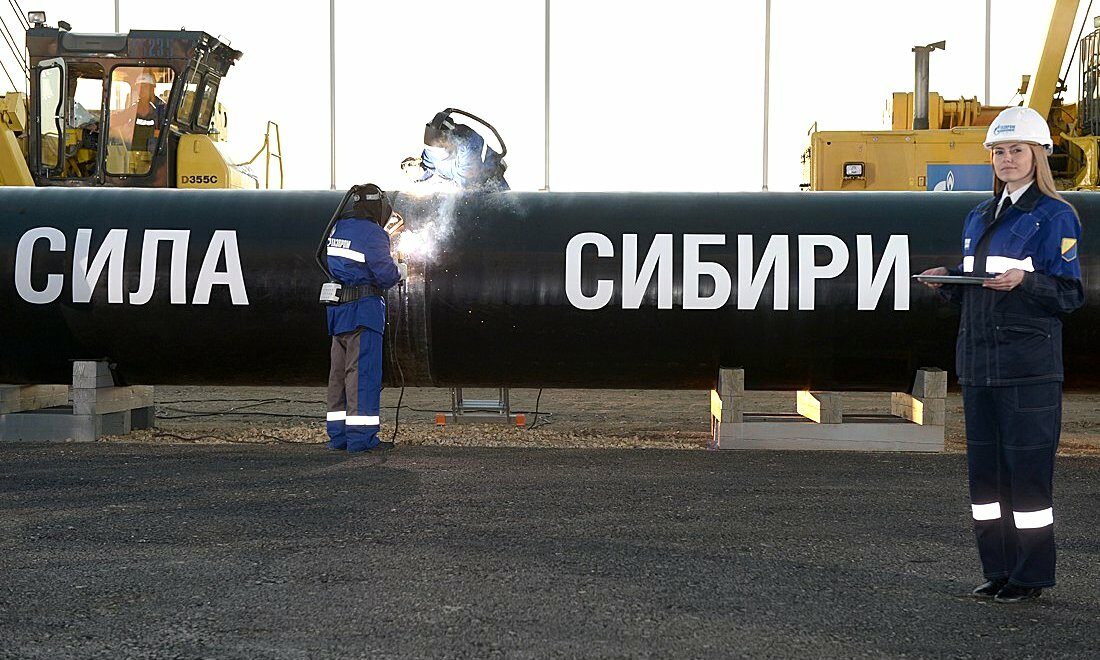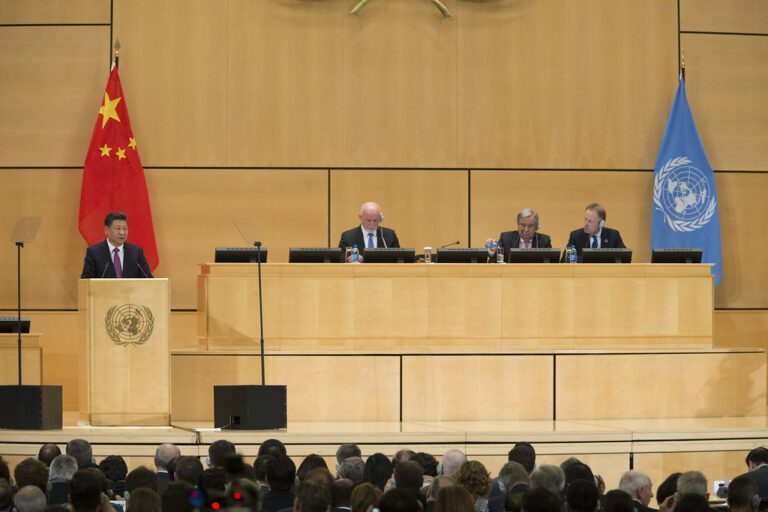
Even as Russia and China project an image of a tight partnership, the failure to reach a deal on the Power of Siberia 2 pipeline complicates Moscow’s official narrative.
In a contested news setting where contradictory conclusions are often drawn on the depth and scope of the Sino-Russian relationship, the scrutiny of every conversation between the leaders of the two countries has entered mainstream media, as journalists and analysts are looking to corroborate or disprove the hypothesis of China’s increasing support to Russia’s invasion in Ukraine, keeping an eye on the progress of bilateral trade, defense, and energy deals.
Although much has been discussed about the under-the-threshold support for Russia’s sanctions evasion, it is the field of energy that has attracted the most attention. The failure to sign a much-anticipated deal on the new “Power of Siberia 2” pipeline that is supposed to connect Russia’s gas to China via Mongolia and serve as an alternative trade route for the Russian gas initially destined for Europe via the now defunct “Nordstream 2” has signaled if not a potential rift, then certainly an expectation gap between Russia and China. The article seeks to illustrate the Russian communication after this underwhelming outcome of the visit, by unpacking the signaling of the officials, commentators, and state media.
Energy at the Core
One of the most persistent narratives that comes up whenever Russian and Chinese leaders meet is the story of high value-added cooperation and innovation. The reality, however, is that the real cooperation lies in energy, and this avenue of cooperation only increases. Per Chinese customs, “in the first two months of 2023, Russia overtook Saudi Arabia to become the top supplier of oil to China, with imports of Russian crude reaching 1.94 million barrels per day. Russia’s total crude exports to China soared to 15.68 million metric tons, up 24 percent year-on-year.”
As Russian Prime Minister Mikhail Mishustin welcomed Xi Jinping in Moscow, he also underscored: “Our energy partnership, which covers all areas of industry, is of a strategic nature. These are natural gas, oil, oil products, coal, electricity and peaceful nuclear energy.” It is quite clear that energy will also form an important part of the upcoming “Plan to Promote Key Elements of Russian-Chinese Economic Cooperation until 2030”, which, according to the Russian side, is currently being drafted.
If all is well in energy, then how can the failure to produce a deal during Xi Jinping’s visit be explained? The specific reasons behind the delay are not public knowledge. Disagreement over the financial terms, China’s current reduced demand for natural gas, as well as the overall strategic unwillingness of Xi Jinping to increase any national dependences, including on Russian resources, have been named as just a few motivations.
Whatever the details of the suspension may be, there is little space for doubt that the delay is caused by the Chinese side and Russian communication knows better than to contest that. The story of Russia’s reluctance would be hard to believe, especially given the official preliminary signaling, with Moscow communicating on multiple occasions to both domestic and international audiences that the deal is about to be completed.
After all, in the Autumn of 2022, Vladimir Putin himself announced that “We intend to expand the geography of our deliveries” and that Russia would begin the construction of “such promising projects as the Power of Siberia 2 and its Mongolian section Soyuz-Vostok”. Given the high-level backing of the project, how does the Russian side signal the scope and timeline of the setback?
What Setback? All is Well!
Russian communications are still inhabiting the little maneuver room it has left to keep China’s reluctance from casting a shadow on “a model of a new type of major-country relationship featuring mutual respect, peaceful coexistence, and win-win cooperation” that China and Russia are said to have developed. Russia’s approach to explaining the setback is multifold: Russian officials are pushing back on the Western news narrative, while communicating, including through official media, that the deal has been reached in principle and now it is to the lower bureaucrats to hammer out the details; finally, ‘independent’ commentators are left to signal that China needs to hurry, too.
First of all, Russia has pushed back against the reports that there has even been a setback. Immediately after the visit, Dmitri Peskov, when answering a question about how the Kremlin could explain the information published earlier by Bloomberg that Xi Jinping allegedly did not give explicit consent to increase the supply of Russian gas, is quoted as saying: “Bloomberg provides a report, but they don’t indicate a source, nothing. It just looks like these poorly skilled [information] injections.” Peskov reiterated that the Power of Siberia 2 gas pipeline was actively discussed, and “all the details and formalities have already been agreed upon with the Mongolian side”.
As to the second approach, with a small addition of the adverb almost, Putin himself signaled success on March 21, 2023, right after the meeting with Chinese counterparts: “We have just discussed a good project, this is the new Power of Siberia 2 gas pipeline through Mongolia. Almost all the parameters of this agreement have been agreed upon. This is 50 billion cubic meters of gas– reliable, stable supplies from Russia.” The pipeline project is still listed among the outcomes of the visit in the official media, again, with a slight almost. “And no less impressive is the information that almost all the parameters for launching the [project] have already been agreed upon,” writes Dmitry Kosyrev, a political observer at RIA Novosti known for his anti-Western views with a special affinity for Chinese culture, as testified by his choice of the nom de plume Master Chen.
The third approach stands out among the three, because it is contradictory to the first two stories of the deal basically having been agreed upon. This approach admits that perhaps the most ambitious agenda of the Xi-Putin meeting was not reached after all.
“The turn towards realization is not even being reported on”, admits Mikhail Kokorev, a journalist known for often interviewing the Russian ex-spy to the US Maria Butina and sporting USSR memorabilia in “Aurora” studio, in his opening remarks to the Youtube show “Geoenergetics INFO.” Kokorev further asks his guest, Aleksandr Frolov, the deputy general director of the National Energy Institute, the tough question: “Does China not need gas from Power of Siberia 2”? Frolov immediately explains: “The contract over Power of Siberia 2 has been discussed for many years. And its main parameters are indeed agreed upon. One last parameter is left – the price.” Frolov further argues that “ China also has weak sides in these negotiations, it also has the necessity to force the outcome… Nevertheless, we will reach an agreement in the end, because China needs these shipments. From all points of view,” he concludes.
Perhaps the theater of the investigative media is being played here – the journalist seemingly does not shy away from tough questions, but the expert dispels any doubts over Russia’s weaknesses or lack of success.
In a similar, yet less optimistic approach, Valery Andrianov, associate professor at the Financial University under the Government of the Russian Federation and an expert at the InfoTEK analytical center, explains that even though China can be tough on the pricing, it is still a better partner for Russia than the geopolitically distant Europe, therefore implying likely Russian concessions: “negotiations with China on price and terms of supply are always a difficult quest,” Andrianov says. “But it’s one thing to discuss prices with China as part of a mutually beneficial deal, and another thing is Europe’s politically motivated and unfounded hysteria around Russian energy imports,” concludes Andrianov.
Currently, according to Russian Deputy Prime Minister Alexander Novak, “Russia is aiming to agree on key contracts for the Power of Siberia 2 gas pipeline to China later this year.” Whether this is another attempt at forcing the deal that is not yet ripe to be completed, or indeed just an extension to leverage the other side into agreeing on the price, remains to be seen. It is clear, however, that in its domestic communication Russian officials, state media and commentators are exercising the “depends on how you look at it” approach and consciously overplaying Russia’s influence.
The title of the piece comes from Russian “Eto kak posmotret'” a response of a Russia-based energy analyst to the author’s question if the delay in signing the “Power of Siberia 2” pipeline deal harms Russian interests.
Written by
Una Aleksandra Bērziņa-Čerenkova
UCerenkovaDr. Una Aleksandra Bērziņa-Čerenkova is a Research Fellow at CHOICE and Head of the Political Science PhD programme and China Studies Centre at Riga Stradins University, Head of the Asia Programme at the Latvian Institute of International Affairs, a member of CHERN and European Think-tank Network on China (ETNC).


